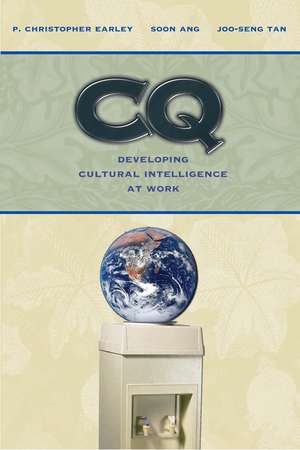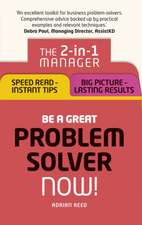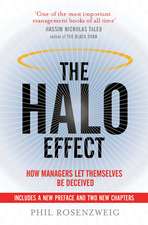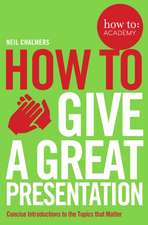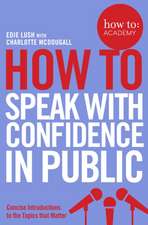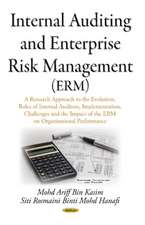CQ: Developing Cultural Intelligence at Work
Autor P. Earley, Soon Ang, Joo-Seng Tanen Limba Engleză Paperback – 29 apr 2010
This book explains to those living and working in another country how to identify and develop their Cultural Intelligence, or CQ. Cultural intelligence is an outsider’s natural ability to interpret and respond to unfamiliar cultural signals in an appropriate manner.
CQ is distinguished by three core features: the head, or the ability to discover new information about a culture; the heart, or one’s motivation and confidence in dealing with a culture; and the body, or the capability to adapt actions and behavior so that they are appropriate in a new culture.
A manager with a high CQ can enter into new cultural settings—national, professional, organizational, regional—and immediately understand what is happening and why, confidently interact with people, and engage in the right actions. Filled with real-world examples and case studies, this book explains how to assess one’s own skills and improve one’s CQ.
CQ is distinguished by three core features: the head, or the ability to discover new information about a culture; the heart, or one’s motivation and confidence in dealing with a culture; and the body, or the capability to adapt actions and behavior so that they are appropriate in a new culture.
A manager with a high CQ can enter into new cultural settings—national, professional, organizational, regional—and immediately understand what is happening and why, confidently interact with people, and engage in the right actions. Filled with real-world examples and case studies, this book explains how to assess one’s own skills and improve one’s CQ.
| Toate formatele și edițiile | Preț | Express |
|---|---|---|
| Paperback (1) | 139.84 lei 22-36 zile | |
| Stanford University Press – 29 apr 2010 | 139.84 lei 22-36 zile | |
| Hardback (1) | 215.59 lei 22-36 zile | |
| Stanford University Press – feb 2006 | 215.59 lei 22-36 zile |
Preț: 139.84 lei
Nou
Puncte Express: 210
Preț estimativ în valută:
26.76€ • 28.01$ • 22.27£
26.76€ • 28.01$ • 22.27£
Carte disponibilă
Livrare economică 10-24 martie
Preluare comenzi: 021 569.72.76
Specificații
ISBN-13: 9780804771726
ISBN-10: 0804771723
Pagini: 264
Dimensiuni: 152 x 229 x 18 mm
Greutate: 0.36 kg
Editura: Stanford University Press
Colecția Stanford Business Books
ISBN-10: 0804771723
Pagini: 264
Dimensiuni: 152 x 229 x 18 mm
Greutate: 0.36 kg
Editura: Stanford University Press
Colecția Stanford Business Books
Recenzii
"This book is an immensely useful guide to the use of cultural intelligence at work. Cultural intelligence is the individual's capacity for successful work and social adaptation to new cultural settings, and indeed to any unfamiliar social environment. Part I details the various components of cultural intelligence. Part II provides realistic, practical, culture-sensitive stories from intercultural work settings. It describes how leading multicultural organizations deal with cultural diversity, how to create high performing international teams, how to improve job assignments to other cultures, how to deal with a diverse work force, and how to lead people in international organizations."—Harry C. Triandis, University of Illinois, at Urbana-Champaign
"One of tomorrow's certainties is that more and more people will need to understand the effects of culture on behavior and the impact of cultural differences. In CQ, the authors give us important frameworks and insights for developing an understanding of cultures other than our own. Throughout the book, interesting, intriguing, and stimulating examples are presented that focus on cultural differences in workplace interactions and the necessity for dealing with them effectively from the points of view of all stakeholders involved."—Richard Brislin, University of Hawaii
Notă biografică
P. Christopher Earley is Auran J. Fox Chair in Business and Dean of the University of Connecticut School of Business. Soon Ang is the Goh Tjoei Kok Chair Professor in International Management & IT at the Nanyang Business School, Nanyang Technological University, Singapore. Joo-Seng Tan is Associate Professor of Management at Nanyang Technological University's Nanyang Business School.
Descriere
This book helps a manager understand and assess personal cultural intelligence and how to leverage this capability in diverse work environments.
Textul de pe ultima copertă
“This book is an immensely useful guide to the use of cultural intelligence at work. Cultural intelligence is the individual’s capacity for successful work and social adaptation to new cultural settings, and indeed to any unfamiliar social environment. Part I details the various components of cultural intelligence. Part II provides realistic, practical, culture-sensitive stories from intercultural work settings. It describes how leading multicultural organizations deal with cultural diversity, how to create high performing international teams, how to improve job assignments to other cultures, how to deal with a diverse work force, and how to lead people in international organizations.”—Harry C. Triandis, University of Illinois, at Urbana-Champaign
“One of tomorrow’s certainties is that more and more people will need to understand the effects of culture on behavior and the impact of cultural differences. In CQ, the authors give us important frameworks and insights for developing an understanding of cultures other than our own. Throughout the book, interesting, intriguing, and stimulating examples are presented that focus on cultural differences in workplace interactions and the necessity for dealing with them effectively from the points of view of all stakeholders involved."—Richard Brislin, University of Hawaii
“One of tomorrow’s certainties is that more and more people will need to understand the effects of culture on behavior and the impact of cultural differences. In CQ, the authors give us important frameworks and insights for developing an understanding of cultures other than our own. Throughout the book, interesting, intriguing, and stimulating examples are presented that focus on cultural differences in workplace interactions and the necessity for dealing with them effectively from the points of view of all stakeholders involved."—Richard Brislin, University of Hawaii
